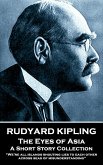In "The Eyes of Asia," Rudyard Kipling presents a compelling narrative that intertwines rich descriptions with poignant commentary on the socio-political landscape of colonial India and its neighboring regions. Through a series of interconnected stories and vivid characterizations, Kipling explores themes of imperialism, cultural encounter, and moral ambiguity, employing his signature prose style characterized by rhythmic language and an acute sense of place. The literary context reflects the complexities of the British Raj and the diverse tapestry of life in Asia, as Kipling deftly navigates the intersections of East and West, showcasing both admiration and criticism of colonial ideologies. Rudyard Kipling, a product of the Victorian era, was steeped in the complexities of British colonialism, having spent his formative years in India. His deep familiarity with the landscape, customs, and peoples of Asia informed his writing, positioning him as a bridge between cultures. His unique experiences, including his return to England and eventual travels, irreversibly shaped his perspectives, providing a rich backdrop for his examination of imperial themes and human relationships. This book is a must-read for those interested in colonial literature and the nuanced perspectives it offers. It invites readers to engage with historical context while simultaneously reflecting on the enduring legacies of colonization. Kipling'Äôs masterful storytelling captures both the beauty and the contradictions of the Asian experience, making this work relevant for contemporary discussions of identity, culture, and power.
Dieser Download kann aus rechtlichen Gründen nur mit Rechnungsadresse in A, B, BG, CY, CZ, D, DK, EW, E, FIN, F, GR, H, IRL, I, LT, L, LR, M, NL, PL, P, R, S, SLO, SK ausgeliefert werden.









